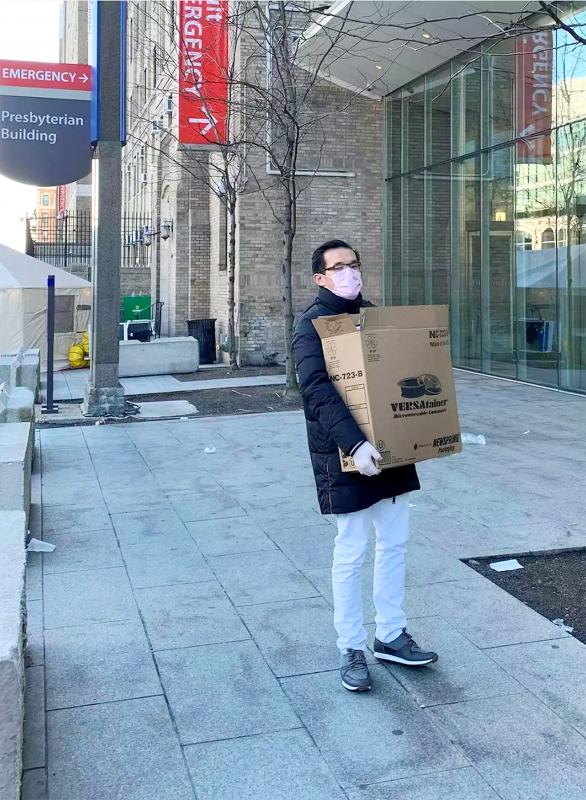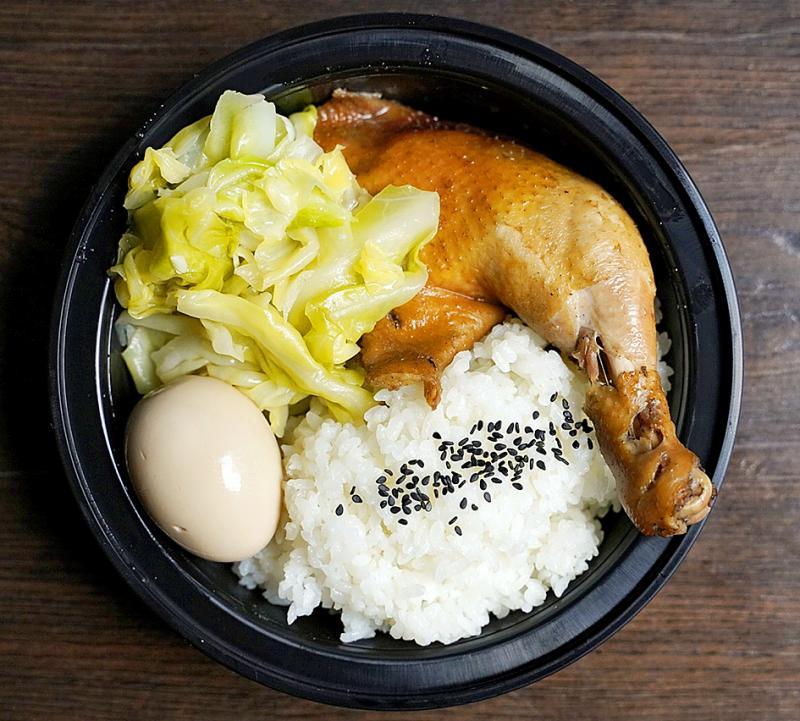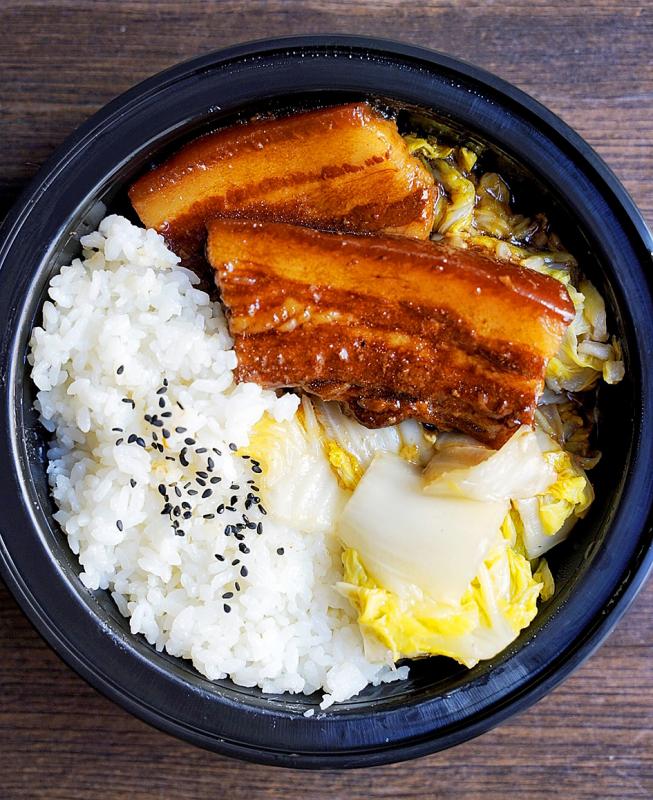Few major cities around the world have been hit harder by the COVID-19 pandemic than New York. To stem the spread of the novel coronavirus, on the morning of March 16 New York Governor Andrew Cuomo announced that, from 8pm that day, restaurants and bars across the state would have to close to anything but take-out and delivery business.
Taiwanese restaurateurs are among those who have had to shutter their enterprises or — like Eric Sze (史官), co-founder of 886 — pivot to a new business model.
“February is normally an improvement over January. But by Valentine’s Day this year, sales hadn’t picked up. February’s business ended up being down 20 percent year-on-year. The week before the shutdown, it was down by 80 percent,” says Sze, who moved to New York for college in 2011, and opened 886 in the East Village in July 2018.

Photo courtesy of Eric Sze
“We’re operating the business in a more creative way right now. We’ve been receiving donations from all over the US and using them to deliver bentos to hospital staff. We’ve accumulated more than US$70,000 in three weeks, and have delivered more than 4,000 bentos to hospitals,” says Sze.
“Social media has been our biggest tool. We’ve managed to hire back our entire kitchen for our bento operation,” says the Taipei native.
Sze advises other businesspeople to “find ways to take care of your staff, do whatever it takes. It’s time to show the good side of humanity as business owners. Be a good person and good things will happen.”

Photo courtesy of Eric Sze
That said, Sze has encountered some unkind individuals.
“Xenophobia is real, but luckily nothing major has happened. People yell ‘coronavirus’ from across the street,” he says.
Shifting to non-profit deliveries has meant changing the kind of meals 886 produces.

Photo courtesy of Eric Sze
“Before, we were best known for our honey glazed popcorn chicken and what we call the ‘Sausage Party,’ our version of dachang bao xiaochang (大腸包小腸, sausage wrapped in glutinous rice). Now, the food is designed to be microwaved. It’s kind of like 7-11 [bento box].”
Asked if he can make any predictions about his restaurant’s future, Sze says that there are too many variables to consider.
“We can’t expect anything, but we hope for the best. The US government is a mess and clearly unprepared for such a pandemic,” he says.
CROWDFUNDING
Richard Ho (何瑞運), founder of Ho Foods, witnessed a similar trajectory to Sze.
Ho says business slowed down in February and held steady until about mid-March.
“We started this restaurant because we wanted to share Taiwanese food with New York, and we’ve never stopped wanting to do that. But, at some point, everyone has to confront the truth, and making that decision to close was really tough,” he says.
Ho Foods — opened in January 2018 and praised by the New York Times for its beef noodle soup — is located less than half a mile from 886.
“We thought about doing take-outs, but our space is so small. Having people come in and out of the shop just didn’t seem appropriate,” says Ho, who grew up in the Los Angeles area.
Ho Foods is one of several New York food businesses that’s been crowdfunding financial support for our workers.
“Not that we can match their pay pre-crisis, but we can at least support them with a bit of income to help,” says Ho, who stresses that every dollar so raised goes to employees and their families, not Ho Foods’ owners or investors.
For the time being, some of Ho Foods’ staff are back at work. Since the beginning of April, they’ve joined the effort led by 886 and Raku (Taiwanese-owned, but specializing in udon noodles and other Japanese dishes) to feed hospital workers.
“It just seems like the right thing to do. It also allows us to continue cooking with a small staff and very little outside contact,” Ho says.
Ho doesn’t yet know if his restaurant can survive if the pandemic goes on beyond May.
“Our insurance company sent out notices that this crisis would not be covered. Our state government is looking to change that, but who knows,” he says.
The restaurateur hopes that the US Small Business Administration’s Paycheck Protection Program will help entrepreneurs stay afloat. Under the program, short-term loans may be forgiven if the money is used for payroll, rent, mortgage interest or utilities.
Another of New York’s Taiwanese eateries, Brooklyn’s Win Son, has responded to regulars who inquired about buying gift cards or merchandise, because they want to help the restaurant survive the crisis, by requesting they instead donate to a fund “to benefit workers with citizenship and document challenges.”
Win Son is continuing to offer sesame noodles and other dishes for takeaway and delivery. Its bakery offshoot, which is just across the road from the restaurant, is also operating on a delivery/pickup-only basis. Win Son’s Web site reminds customers that they aren’t allowed into either shop, and if pickup an order, “to keep a safe distance from other folks when waiting outside.”

April 14 to April 20 In March 1947, Sising Katadrepan urged the government to drop the “high mountain people” (高山族) designation for Indigenous Taiwanese and refer to them as “Taiwan people” (台灣族). He considered the term derogatory, arguing that it made them sound like animals. The Taiwan Provincial Government agreed to stop using the term, stating that Indigenous Taiwanese suffered all sorts of discrimination and oppression under the Japanese and were forced to live in the mountains as outsiders to society. Now, under the new regime, they would be seen as equals, thus they should be henceforth

Last week, the the National Immigration Agency (NIA) told the legislature that more than 10,000 naturalized Taiwanese citizens from the People’s Republic of China (PRC) risked having their citizenship revoked if they failed to provide proof that they had renounced their Chinese household registration within the next three months. Renunciation is required under the Act Governing Relations Between the People of the Taiwan Area and the Mainland Area (臺灣地區與大陸地區人民關係條例), as amended in 2004, though it was only a legal requirement after 2000. Prior to that, it had been only an administrative requirement since the Nationality Act (國籍法) was established in

Three big changes have transformed the landscape of Taiwan’s local patronage factions: Increasing Democratic Progressive Party (DPP) involvement, rising new factions and the Chinese Nationalist Party’s (KMT) significantly weakened control. GREEN FACTIONS It is said that “south of the Zhuoshui River (濁水溪), there is no blue-green divide,” meaning that from Yunlin County south there is no difference between KMT and DPP politicians. This is not always true, but there is more than a grain of truth to it. Traditionally, DPP factions are viewed as national entities, with their primary function to secure plum positions in the party and government. This is not unusual

US President Donald Trump’s bid to take back control of the Panama Canal has put his counterpart Jose Raul Mulino in a difficult position and revived fears in the Central American country that US military bases will return. After Trump vowed to reclaim the interoceanic waterway from Chinese influence, US Defense Secretary Pete Hegseth signed an agreement with the Mulino administration last week for the US to deploy troops in areas adjacent to the canal. For more than two decades, after handing over control of the strategically vital waterway to Panama in 1999 and dismantling the bases that protected it, Washington has